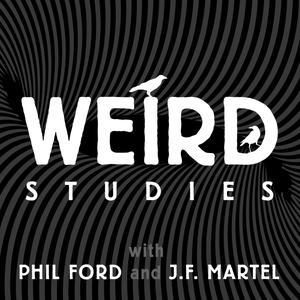
Weird Studies
Phil Ford and J. F. Martel
Art and philosophy at the limits of the thinkable
- 1 hour 21 minutesEpisode 183: On Hermann Hesse's 'Siddhartha'
Hermann Hesse's Siddhartha is one of the great novels of the twentieth century and a prime example of literature that transforms the deeply personal into something universal. For Phil and JF in this episode, the novel serves as the foundation for a discussion on spiritual journeying, the ideal of enlightenment, and the challenge of living in an ensouled universe.
Sign up for JF's new Weirdosphere course on the supernatural, starting on February 6th, 2025.
Purchase tickets to the Weirdosphere screening of Aaron Poole's Dada on February 1st, 2025.
Support us on Patreon.
Buy the Weird Studies soundtrack, volumes 1 and 2, on Pierre-Yves Martel's Bandcamp page.
Listen to Meredith Michael and Gabriel Lubell's podcast, Cosmophonia.
Visit the Weird Studies Bookshop
Find us on Discord
Get the T-shirt design from Cotton Bureau!REFERENCES
Herman Hesse, Siddhartha
Christopher Theofanidis and Melissa Studdard, Siddhartha
Gustav Holst, The Planets
Richard Wagner, Parsifal
G. K. Chesterton, Orthodoxy
Colin Wilson, The Outsider
Adam Kirsch, “Herman Hesse’s Arrested Development”
Dogen, Genjakoan
Chögyam Trungpa, Cutting Through Spiritual Materialism22 January 2025, 3:30 pm - 1 hour 20 minutesEpisode 182: Providence of Evil: On Robert Eggers' 'Nosferatu'
In this episode, JF and Phil examine the myth of the vampire through the lens of Robert Eggers' latest film, Nosferatu, a reimagining of F. W. Murnau's German Expressionist masterpiece. Topics covered include the nature of vampires, the symbolism of evil, the implicit theology of Eggers' film (compared with that of Coppola's Bram Stoker's Dracula), the need for shadow work, as well as the power of real introspection and self-sacrifice.
Support us on Patreon.
Buy the Weird Studies soundtrack, volumes 1 and 2, on Pierre-Yves Martel's Bandcamp page.
Listen to Meredith Michael and Gabriel Lubell's podcast, Cosmophonia.
Visit the Weird Studies Bookshop
Find us on Discord
Get the T-shirt design from Cotton Bureau!REFERENCES
Robert Eggers (dir.), Nosferatu
F. W. Murnau (dir.), Nosferatu
Mel Brooks (dir.), Dracula: Dead and Loving It
Francis Ford Coppola (dir.), Bram Stoker’s Dracula
Bram Stoker, Dracula
Richard Wagner, Tristan und Isolde
David James Smith, “The Archaeologist Couple who Unearthed a Field Full of Vampires”
Robert Eggers, The Witch
Richard Strauss, Salome
Weird Studies, Episode 156 on “The Secret History”
Rudolf Steiner, “Lucifer and Ahriman”
Richard Wagner, Ring Cycle8 January 2025, 3:30 pm - 44 minutes 43 secondsHoliday Bonus: Waiting for the Next Sentence
With the next flagship show set to drop on January 8, 2025, we thought we'd tide you over with this conversation on the art and craft and writing, originally recorded for Listener's Tier patrons on the Weird Studies Patreon.
To join our Patreon community, please visit www.patreon.com/weirdstudies.
To purchase tickets to Phil and JF's winter solstice celebration, happening on Weirdosphere on Thursday, December 19, at 8 pm Eastern, please visit www.weirdosphere.org.
We wish you a happy and safe holiday season! The journey continues in 2025.
18 December 2024, 3:30 pm - 1 hour 17 minutesEpisode 181: On 'The X Files,' with Meredith Michael
Chris Carter's The X-Files is weird on its face: a dramatic series that, from the start, presented itself as more than drama, an exploration of the reality of the paranormal using the tools of fiction, a fantasy posing as reality (or is it the other way around?). Strangely prescient, undeniably zany, and truly "hyperstitious," the series is likely to strike contemporary viewers as equal parts naive and prophetic. In this episode, music scholar and Weird Studies assistant Meredith Michael joins Phil and JF for a deep dive into the archival sublime of the filing cabinet marked "X."
To purchase tickets to JF and Phil's December 19th solstice event on Weirdosphere, with live music by Pierre-Yves Martel, to to weirdosphere.org.
Support us on Patreon.
Buy the Weird Studies soundtrack, volumes 1 and 2, on Pierre-Yves Martel's Bandcamp page.
Listen to Meredith Michael and Gabriel Lubell's podcast, Cosmophonia.
Visit the Weird Studies Bookshop
Find us on Discord
Get the T-shirt design from Cotton Bureau!REFERENCES
Cut-up technique
Phil Ford, “The View from the Cheap Seats at the UFO Show”
Richard Dawkins, Unweaving the RainbowSpecial Guest: Meredith Michael.
4 December 2024, 4:30 pm - 1 hour 21 minutesEpisode 180: The Player: On the Magician Card in the Tarot
The Magician card likely graces more front covers of books on the tarot than any of the other major arcana. In many ways, it symbolizes the tarot itself, or the individual who has mastered the art of manipulating the cards to divine their meanings. Yet, the Magician is a profoundly ambiguous figure. From one perspective, he is the Magus, piercing through the illusions of ceaseless becoming to glimpse the hidden depths of reality. From another, he is all surface without depth, a carnival huckster ready to empty your coin purse while you’re transfixed by his crystal ball. In this episode, JF and Phil continue their on-again, off-again journey through the major trumps with a discussion of the card that—deservedly or not—proudly calls itself Number One.
Support us on Patreon.
Buy the Weird Studies soundtrack, volumes 1 and 2, on Pierre-Yves Martel's Bandcamp page.
Listen to Meredith Michael and Gabriel Lubell's podcast, Cosmophonia.
Visit the Weird Studies Bookshop
Find us on Discord
Get the T-shirt design from Cotton Bureau!REFERENCES
Our Known Friend, Meditations on the Tarot
Weird Studies, Episode 24 on “The Charlatan and the Magus”
Weird Studies, Episode 109 and Episode 110 on The Glass Bead Game
Weird Studies, Episode 179 with Lionel Snell
Friedrich Nietzsche, On the Geneology of Morals
Louis Sass, Modernism and Madness
Gilles Deleuze, Pure Immanence
Richard Wagner, Parsifal
William Irwin Thompson, The Time Falling Bodies Take to Light
Participation mystique
Aleister Crowley, The Book of Thoth
Leigh Mccloskey, Tarot Re-visioned20 November 2024, 4:15 pm - 1 hour 17 minutesEpisode 179: The Final Frontier, with Lionel Snell
One of the great rewards of "weirding" the world is learning that boredom may be a kind of ethical transgression—the world is simply too strange to allow for it, and if you're bored, you're at least partly to blame. Few have put this notion to the test as rigorously as Lionel Snell, whose work as a magician celebrates the wonders of everyday events, from a walk in the park to a moment of car trouble. Unlike the pursuit of the extraordinary that often defines occult practice, Snell's approach reminds us of the magic in the mundane. In this episode, Snell, also known as Ramsey Dukes, shares the insights he's gained over his decades-long career as one of the leading figures in contemporary magical theory and practice.
For an exclusive Vimeo link to Aaron Poole's film Dada mentioned in the intro, go to Instagram and send @aaronsghost the direct message "movie link please".
REFERENCES
Ramsey Dukes, Thundersqueak
Weird Studies, Episode 141 on “SSOTBME
Weird Studies, Episode 24 with Lionel Snell
John Crowley, Little, Big
Arthur Machen, “A Fragment of Life”
David Foster Wallace, The Pale King
Max Picard, The Flight from God
Lionel Snell, My Years of Magical Thinking
Robert Anton Wilson, Prometheus Rising
Henry Bergson, Matter and Memory
Russell’s ParadoxSpecial Guest: Lionel Snell [Ramsey Dukes].
6 November 2024, 4:45 pm - 1 hour 12 minutesEpisode 178: Edge of Reality: On John Carpenter's 'In the Mouth of Madness'
Earlier this month, Phil and JF recorded a live episode at Indiana University Cinema in Bloomington following a screening of John Carpenter's film In the Mouth of Madness. Carpenter’s cult classic obliterates the boundary between reality and fiction, madness and revelation—an ideal subject for a Weird Studies conversation. In this episode, recorded before a live audience, the hosts explore the film’s Lovecraftian themes, the porous nature of storytelling, and how art can function as a conduit to unsettling truths.
Special thanks to Dr. Alicia Kozma and the IU Cinema team for hosting and recording the event.
Support us on Patreon.
Buy the Weird Studies soundtrack, volumes 1 and 2, on Pierre-Yves Martel's Bandcamp page.
Listen to Meredith Michael and Gabriel Lubell's podcast, Cosmophonia.
Visit the Weird Studies Bookshop
Find us on Discord
Get the T-shirt design from Cotton Bureau!REFERENCES
John Carpenter, In the Mouth of Madness
John Carpenter, Prince of Darkness*
John Carpenter, The Thing
Joshua Clover, BFI Film Classics: The Matrix
Philip K. Dick, Time Out of Joint
David Cronenberg, Videodrome
Louis Althusser, "Ideology and Ideological State Apparatuses (Notes towards an Investigation)"
Giorgio Agamben, Homo Sacer
Nick Land, English philosopher
H. P. Lovecraft, "The Call of Cthulhu"
Jonathan Carroll, The Land of Laughs23 October 2024, 2:30 pm - 1 hour 27 minutesEpisode 177: Riddles in the Dark: On Fairy Tales, Interpretation, and 'Rapunzel'
Fairy tales are among the most familiar cultural objects, so familiar that we let our kids play with them unsupervised. At the same time, they are also the most mysterious of artifacts, their heimlich giving way to unheimlich as soon as we give them a closer look and ask ourselves what they are really about. Indeed, these imaginal nomads, which seem to evade all cultural and historical capture, existing in various forms in every time and place, can become so strange as to make us wonder if they are cultural at all, and not some unexplained force of nature — the dreaming of the world. In this episode, JF and Phil use "Rapunzel" as a case study to explore the weirdness of fairy tales, illustrating how they demand interpretation without ever allowing themselves to be explained.
Sign up for the upcoming course "Writing at the Wellspring" October 22-December 1 with Dr. Matt Cardin on Weirdosphere.org
Support us on Patreon.
Buy the Weird Studies soundtrack, volumes 1 and 2, on Pierre-Yves Martel's Bandcamp page.
Listen to Meredith Michael and Gabriel Lubell's podcast, Cosmophonia.
Visit the Weird Studies Bookshop
Find us on Discord
Get the T-shirt design from Cotton Bureau!SHOW NOTES
Walter Benjamin, "The Storyteller" in Illuminations (Hannah Arendt, ed.; Harryn Zohn, trans.).
Novalis, Philosophical Writings. (Margaret Mahony Stoljar, trans.).
Cristina Campo, The Unforgivable and Other Writings (Alex Andriesse, trans.)
William Irwin Thompson, Imaginary Landscape
Bruno Bettelheim, The Uses of Enchantment
Marie-Louise von Franz,, Swiss Jungian psychologist
Sesame Street, “Rapunzel Rescue”
Disney’s Tangled
The Annotated Brothers Grimm
Aarne-Thompson-Uther Index
Marina Warner, Once Upon a Time
W. A. Mozart, The Magic Flute
Dante Alighieri, Il Convito
Panspermia hypothesis
Gregory Bateson, Mind and Nature
John Mitchell, Confessions of a Radical Traditionalist
Clint Eastwood (dir.) The Unforgiven9 October 2024, 2:30 pm - 1 hour 21 minutesEpisode 176: On Charles Burns' 'Black Hole' and the Medium of Comics
Comics, like cinema, is an eminently modern medium. And as with cinema, looking closely at it can swiftly acquaint us with the profound weirdness of modernity. Do that in the context of a discussion on Charles Burns' comic masterpiece Black Hole, and you're guaranteed a memorable Weird Studies episode. Black Hole was serialized over ten years beginning in 1995, and first released as a single volume by Pantheon Books in 2005. Like all masterpieces, it shines both inside and out: it tells a captivating story, a "weirding" of the teenage romance genre, while also revealing something of the inner workings of comics as such. In this episode, Phil and JF explore the singular wonders of a medium that, thanks to artists like Burns, has rightfully ascended from the trash stratum to the coveted empyrean of artistic respectability—without losing its edge.
BIG NEWS:
• If you're planning to be in Bloomington, Indiana on October 9th, 2024, click here to purchase tickets to IU Cinema's screening of John Carpenter's In the Mouth of Madness, featuring a live Weird Studies recording with JF and Phil.
• Go to Weirdosphere to sign up for Matt Cardin's upcoming course, MC101: Writing at the Wellspring, starting on 22 October 2024.
• Visit https://www.shannontaggart.com/events and follow the links to learn more about Shannon's (online) Fall Symposium at the Last Tuesday Society. Featured speakers include Steven Intermill & Toni Rotonda, Shannon Taggart, JF Martel, Charles and Penelope Emmons, Doug Skinner, Michael W. Homer, Maria Molteni, and Emily Hauver.
Support us on Patreon.
Buy the Weird Studies soundtrack, volumes 1 and 2, on Pierre-Yves Martel's Bandcamp page.
Listen to Meredith Michael and Gabriel Lubell's podcast, Cosmophonia.
Visit the Weird Studies Bookshop
Find us on Discord
Get the T-shirt design from Cotton Bureau!REFERENCES
Charles Burns, Black Hole
Clement Greenberg’s concept of “medium specificity”
Terry Gilliam (dir.), The Fisher King
Seth, comic artist
Chris Ware, Building Stories
“Graphic Novel Forms Today” in Critical Inquiry
Raymond Knapp, The American Musical and the Performance of Personal Identity
Vilhelm Hammershoi, Danish painter
Ramsey Dukes, Words Made Flesh
G. Spencer-Brown, Laws of Form
Dave Hickey, “Formalism”
Nelson Goodman, Languages of Art
Chrysippus, Stoic philosopher
Scott McCloud, Understanding Comics25 September 2024, 2:30 pm - 1 hour 1 minuteMid-Break Bonus: The Quiet Earth
Every off-week, listeners who have chosen to support Weird Studies by joining our Patreon at the Listener's Tier get to enjoy a bonus episode. These episodes are different from the flagship show. Less formal and entirely improvised, they offer Phil and JF a different way of exploring the weird in art, philosophy and culture. To tide our listenership over until the next new episode drops on September 25th, 2024, here is a recent example of a Weird Studies audio extra, recorded as your hosts were finishing up their first Weirdosphere course, "The Beauty and the Horror." The conversation ended up centering on cultural works we experienced in childhood, and that are all the more magical for being only vaguely remembered.
To enroll in JF's upcoming Weirdosphere course, "Whirl Without End: Fairy Tales and the Weird," please visit www.weirdosphere.org.
21 August 2024, 2:30 pm - 1 hour 58 minutesEpisode 175: Don't Look Now: Live at Lily Dale
Daphne du Maurier was a prolific English writer of novels, plays, and short stories resonant with what she termed "a sense of unreality." In this episode, JF and Phil discuss her great short story "Don't Look Now," which Nicholas Roeg famously adapted to the screen in 1973 in a film starring Donald Sutherland and Julie Christie. Recorded live at Shannon Taggart's Lily Dale Symposium on July 25th, 2024, the discussion takes a number of turns, exploring the ghost as an "image of itself," the phenomenon of "deathishness," the experience of derealization, the human capacity to break time, and grief as a rift in time.
Visit the Weirdosphere and sign up for JF's upcoming course of lectures and discussions, "Whirl Without End: Fairy Tales and the Weird," starting on September 5th, 2024.
Support us on Patreon.
Buy the Weird Studies soundtrack, volumes 1 and 2, on Pierre-Yves Martel's Bandcamp page.
Listen to Meredith Michael and Gabriel Lubell's podcast, Cosmophonia.
Visit the Weird Studies Bookshop
Find us on Discord
Get the T-shirt design from Cotton Bureau!REFERENCES
Daphne du Maurier, "Don't Look Now"
Nicholas Roeg (dir.), Don't Look Now
Weird Studies, Episode 66 on “Diviner’s Time”
Chuck Klosterman, "Tomorrow Rarely Knows”
Thomas Mann, Death in Venice
Peter Medak (dir.), The Changeling
Philip K. Dick, “Schizophrenia and the Book of Changes”7 August 2024, 2:30 pm - More Episodes? Get the App
Your feedback is valuable to us. Should you encounter any bugs, glitches, lack of functionality or other problems, please email us on [email protected] or join Moon.FM Telegram Group where you can talk directly to the dev team who are happy to answer any queries.
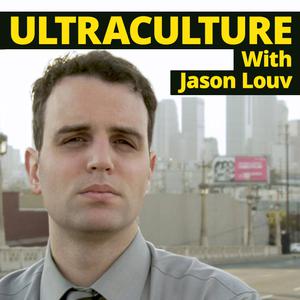 Ultraculture With Jason Louv
Ultraculture With Jason Louv
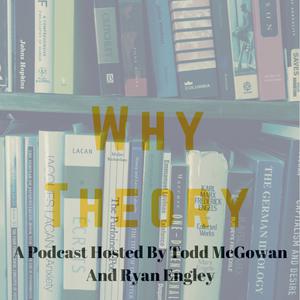 Why Theory
Why Theory
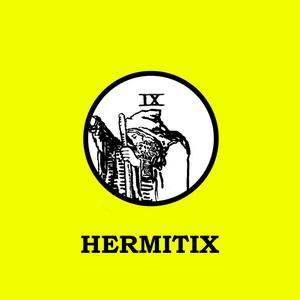 Hermitix
Hermitix
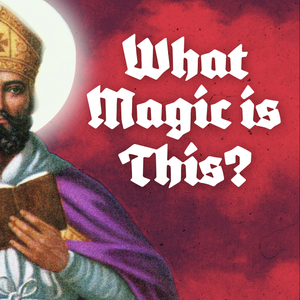 What Magic Is This?
What Magic Is This?
 Acid Horizon
Acid Horizon
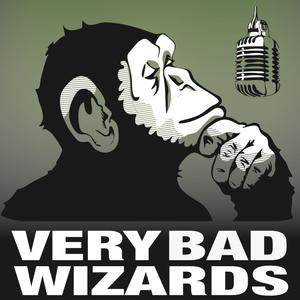 Very Bad Wizards
Very Bad Wizards